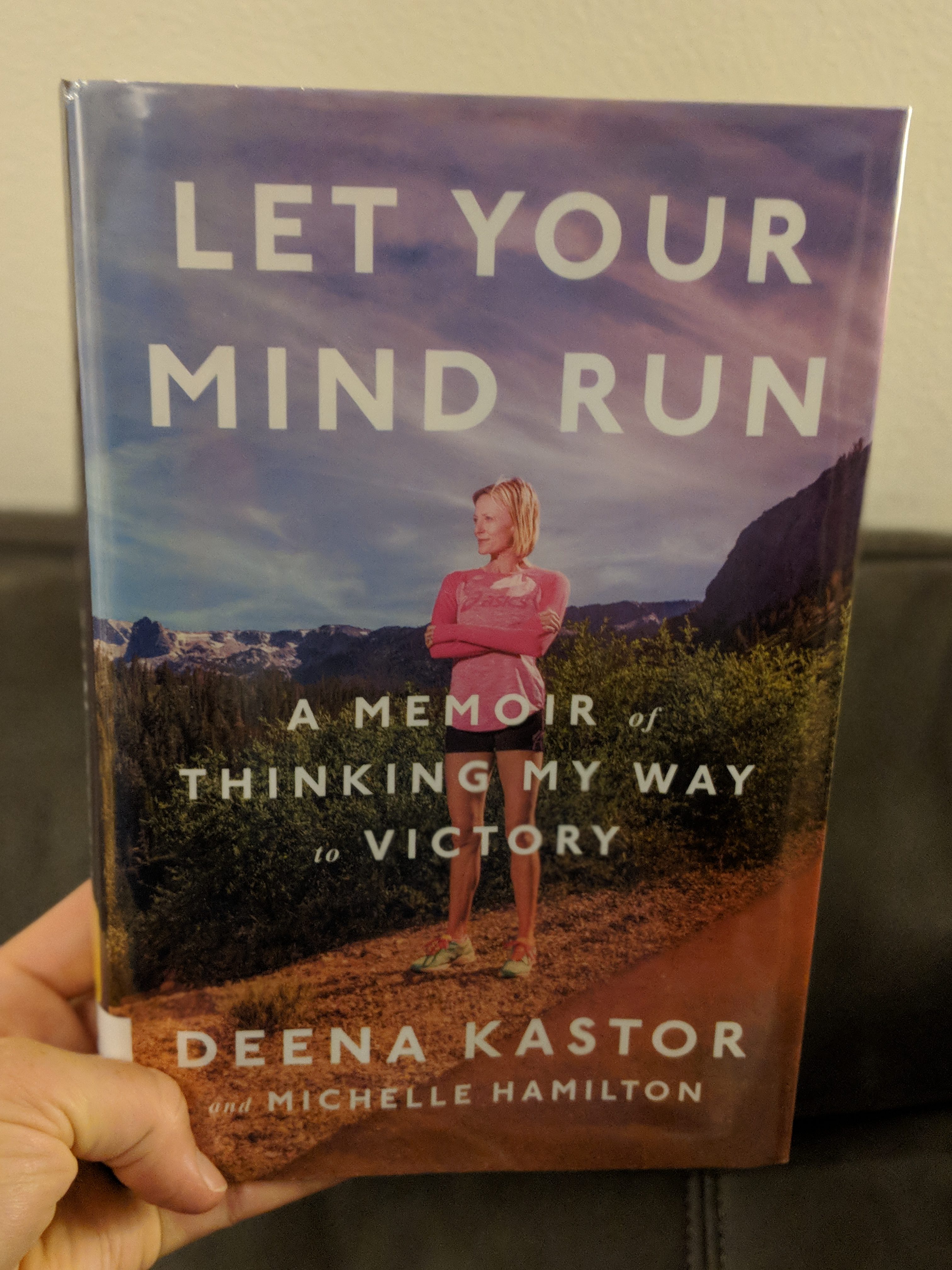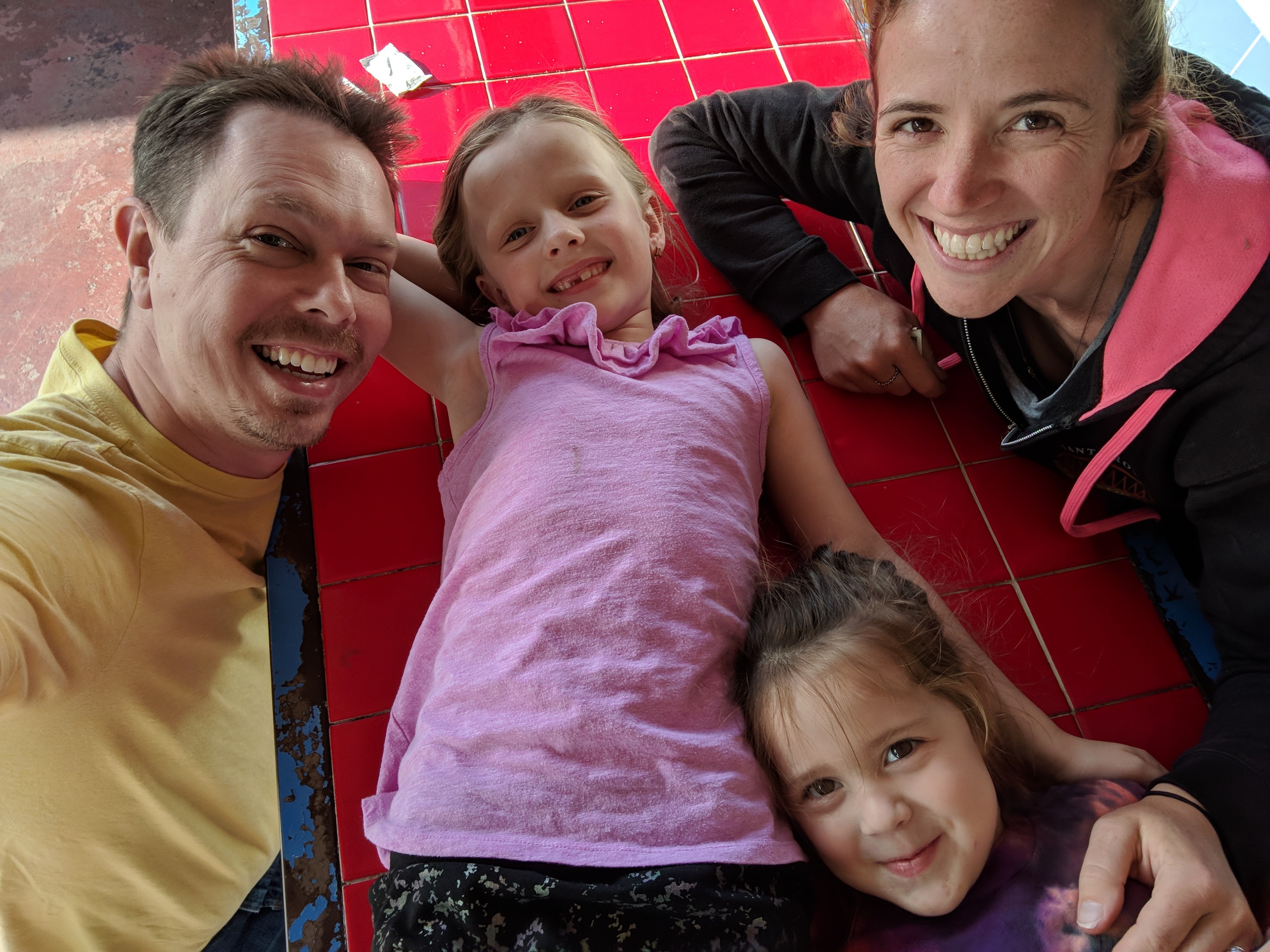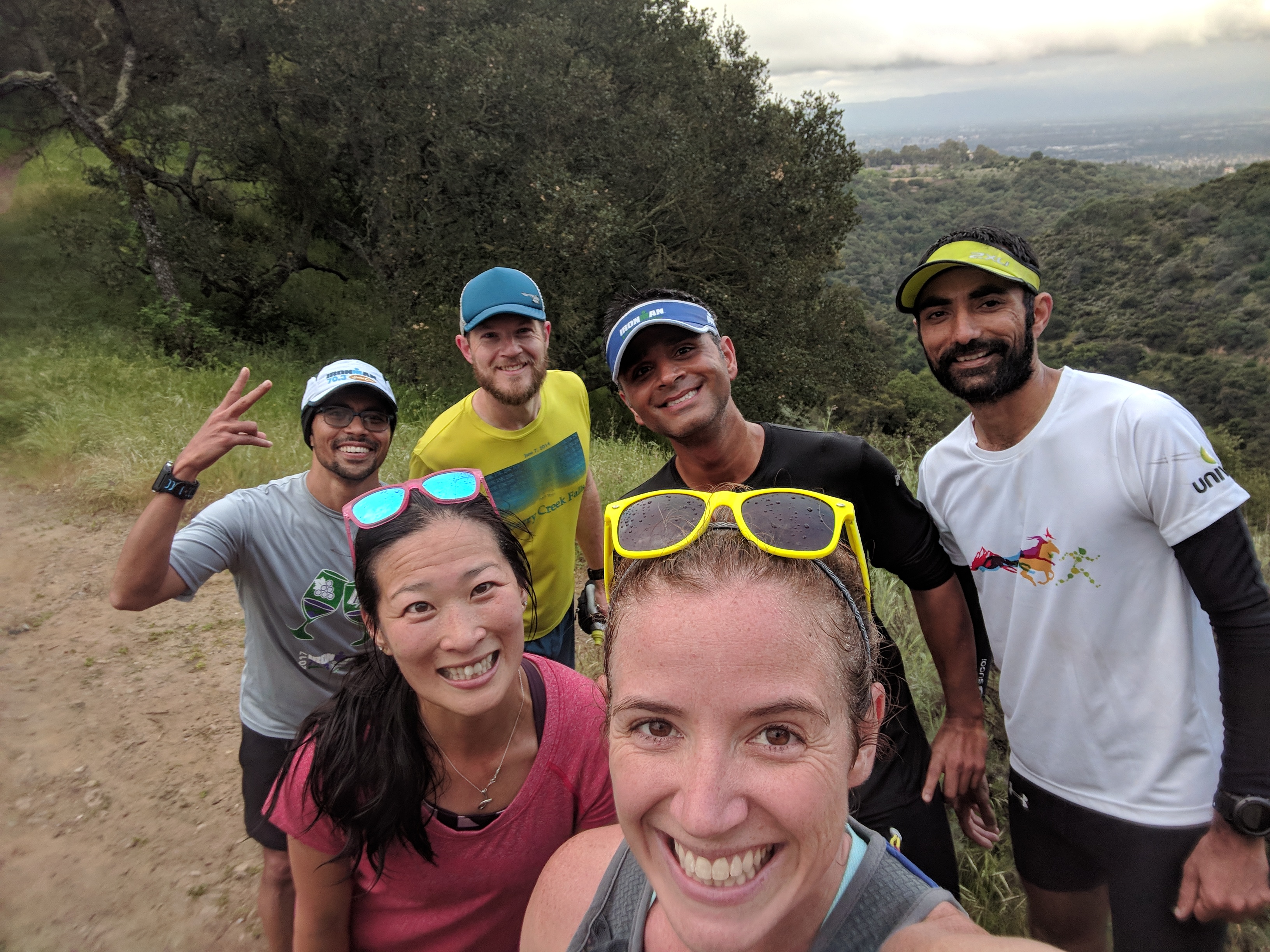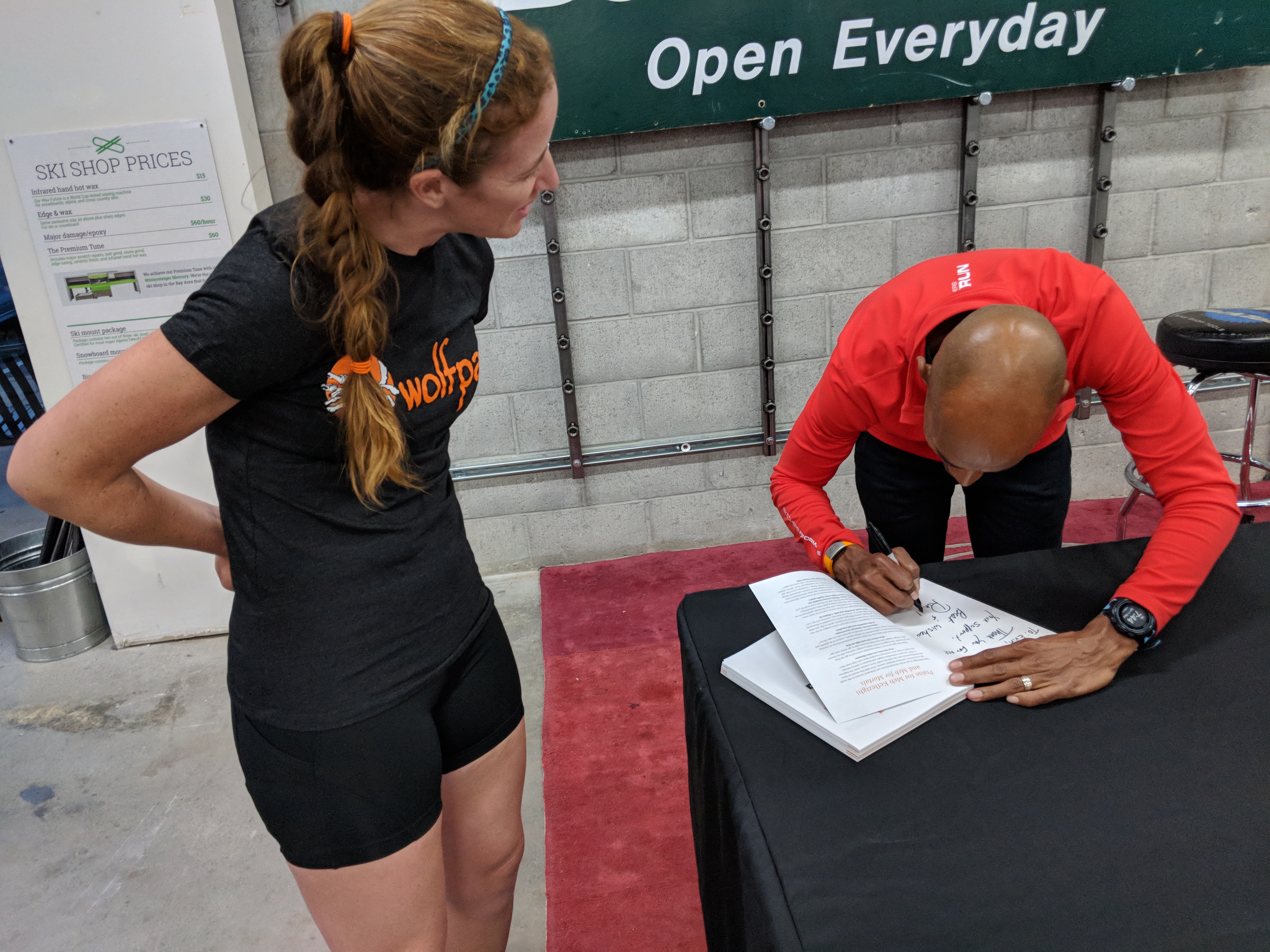Book Review: Deena Kastor’s _Let Your Mind Run: A Memoir of Thinking My Way to Victory_
Everyone loves Deena Kastor; that’s pretty much a fact of life. She seems to have this superhuman quality about her that makes runners who have followed her career, or those lucky enough to know her in real life, all unanimously agree that she is just so great. By no means is this a knock to her, nor am I being insincere; I honestly feel like Deena’s just one of those rare athletes and people to whom everyone gravitates for one reason or another.
I can’t remember where I heard or read it, but the label of being “America’s distance sweetheart” about sums it up for me for Deena. This woman is the real deal, a hardcore and accomplished athlete who has kicked ass and taken names her entire running career, and yet she also seems so incredibly genuine and just — for lack of a better word — real. Plus, there was that one time when she waved to A during the SJ RNR race, when Deena was a pace group leader and ran by us, as we were course monitoring on the Alameda. The fact that she heard and acknowledged my ~4 year-old who yelled “HI DEENA!” pretty much sealed the deal that I’d forever be a Deena fangirl.
It’s probably not a surprise, then, when I first heard that Deena was releasing a memoir, I was just keen as hell to read it as soon as it came out. Let Your Mind Run: A Memoir of Thinking My Way to Victory is Deena’s recently-released book, written with Michelle Hamilton, that takes readers through her running life, beginning with her first foray with the sport as a young child and ultimately into her master’s running years, with all types of adventures and experiences along the way.

Before I read the book, which just came out in the past few months, I heard Lindsey Hein interview her for her podcast, back in late October/early November. Lindsey had her on again relatively recently, right when the book launched, and in the event that you’re pressed for time and can’t read the book anytime soon — but really, go make the time because it’s worth it — both of Lindsey’s interviews with her give a great idea of what Deena’s book is all about.
Of course, because it’s essentially her running life story, Let Your Mind Run gives readers a fairly linear understanding of how she progressed from being a kid who ran pretty fast in southern California to becoming one of the best American distance runners, ever. That can potentially make for fairly dry reading though, right? This type of writing can become akin to essentially reading someone’s resume. Fortunately for us, Deena punctuates all of her running exploits with the behind-the-scenes action and commentary that led her to that very moment. Her writing is accessible and honest and — something that I appreciate — owning of the hard work she put in day after day to get where she wanted to go. She doesn’t self-deprecate because she doesn’t need to. There isn’t any distracting hubris that readers have to sift through, either. She knew she was talented, evidenced by the many victories she pulled fairly effortlessly early on, but eventually, she realized that her talent was only going to get her so far; now, she’d actually have to begin working: and hard.
I noticed that she had dedicated her book to Coach, whom I initially assumed was her husband, Andrew, with whom she has worked for years. I didn’t know anything about the actual coach, Coach Vigil, the man who took a huge bet on her and who arguably helped shape her into such a formidable powerhouse of running. I don’t want to ruin her story, but imagine you deciding today that you want to become one of the best runners in the world, though you don’t really have the marks or history to prove that you’re a shoe-in or capable. Regardless, you woman up and phone the expert on the subject who — for some reason that you may never know nor understand — decides to take you on.
What phenomenal trust from the get-go, right?
Coach Vigil helped get Deena into powerhouse shape by enabling her to take on everything from the super short distances to the marathon. Reading about the many ways her relationship with her coach shaped her running — not just the physical side of her running but perhaps even more importantly, the mental side of it — was such an excellent reminder of the importance that coaches have with their athletes. Similarly, Deena talks a lot about the role of her teammates in her training — exclusively guys, initially — and the ways in which working with others who were better, faster, stronger, fitter, whatever more than she helped to contribute to her growth as an athlete. In the sports psych, running lit, and general “business motivation” genres, there’s so much written about the power of team, and reading a world-class professional runner’s ruminations on the subject is yet another excellent reminder of how important it is to potentially catapulting one’s athleticism to the next level.
One of my biggest takeaways from Deena’s book is the almost palpable sense of gratitude that has seemingly permeated her running from day one. Sure, she absolutely has had bad workouts and subpar races — she’s one of us, after all! — but even when her running wasn’t going as she had envisioned it would, she still seemed to radiate a sense of gratefulness for her abilities to do what she’s doing in the first place and for all the people with whom she had surrounded herself. You might say that it’s revisionist history at its finest, that surely she wasn’t feeling all that grateful when she literally broke herself mid-marathon in Beijing, and I get it. However, I’d argue that reading one of the world’s best marathoners keep perspective on the subject — “I caught my tone. Well, no, wait a second, I’m not a victim here. This is a big deal, but maybe a big deal has a big lesson to teach. I shifted. Why? Why did this happen? It was the better question than ‘Why me?’” — is really powerful stuff.
So often, we runners get in our heads about everything. We take things so seriously, and I’d argue that we do so needlessly. Even the most recreational amongst us make our running so life-or-death serious that we track everything — splits, volume, rest intervals, calories consumed, calories burned, number of hours spent sleeping, and who knows what else minutiae — that you’d think we’re doing this stuff because our mortgage is on the line. So often we get so freaking trees-driven that it’s not even that we can’t see the forest; it’s like we’ve burned it down and left a conflagration in its place. In doing so, we tend to lose the joy that initially brought us to the sport, and suddenly our “I get to go train for a marathon” statements turn into “I have to go train for a marathon.”
You can argue that it’s semantics, but I’d counter that our word choice can have an outsized effect on our moods, feelings, sense of obligation and responsibility, everything related to this hobby that we’re doing for fun, emphasis needed. When we talk about our running in the same way that we talk about needing to clean the toilets or take out the trash, suffice it to say that the loving feeling has flown the coop.
I don’t recall a particular experience or dramatic breakdown that Deena had that made her mentality shift toward running. That said, it seems like her vast experiences in the sport, especially as she climbed the rungs to become one of the best runners in the world, gave her plenty of opportunities to pretty profoundly internalize running’s role in her life and her attitude toward it. Particularly when she was coming back from poor race performances (wherein her mortgage really was on the line) and/or possibly career-ending or season-shortening injuries, she was in a position to evaluate everything and make future choices accordingly. In this respect, it was especially interesting to read about her transition into pregnant running, postpartum running, and master’s running and to see how her goals and training changed as her life fundamentally changed, too. Again: hearing from a professional about this stuff is so refreshing.
There has been so much written recently in sports psych and the running lit worlds about mental toughness, grit, and resilience, and Deena’s book blends that genre with sports memoir in a way that’s memorable and accessible. “Define yourself” is something that I’ll always attribute to Deena — listen to Lindsey’s interviews and read the book for the backstory there — and it’s from Deena’s many poignant passages that I repeatedly found myself nodding along in agreement through her book.
I’ve read before that one of the hardest parts of writing a book, aside from the obvious, is the end. What are the last lessons, the last bit of sagacious wisdom, you as an author wish to confer on your throngs of adoring readers? Out of everything I could have quoted, I think her closing sentiments encapsulate what it means to let one’s mind run and how all of us can “think our way to victory,” in whatever environment we find ourselves. She writes:
“It became a game to hunt down the struggle, to get to the point where negativity bubbled and I had to be more resilient, more creative, more optimistic, and more grateful to emerge stronger from it. Every day I got out there so I could apply the mental habits to life more readily. Staying composed in an anxious pack let me keep my wits in L.A. traffic. I could handle a broken foot in the Olympics, and a broken yolk in the skillet. Patience in a long run gave me patience when Piper’s flute playing got a bit loud. Seeing all the lessons along the way added to my motivation. I had learned disappointment was rooted in the desire to improve and that under the grief, there was deep love. Resiliency opens doors, and compassion and gratitude can dissolve tension, and enrich any moment. What more can I understand? I ran on to see what discovery and life lesson would emerge from the miles ahead.” (278)
Many runners will claim that running, and in particular, long distance running, is as much a mental endeavor as it is physical. Deena Kastor’s Let Your Mind Run shows how that symbiotic relationship can play out and how those lessons we learn in the many miles we post — the lessons about ourselves, about our world, about our relationships, and just about everything else — can permeate the rest of our lives in meaningful, long-lasting ways and that we really do become better for it and because of it.








